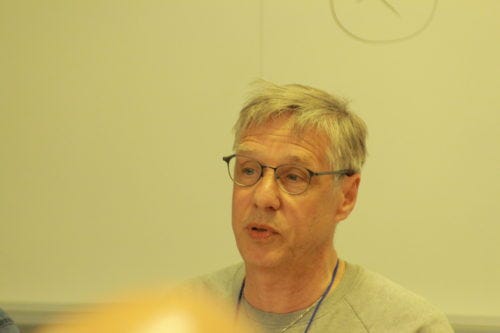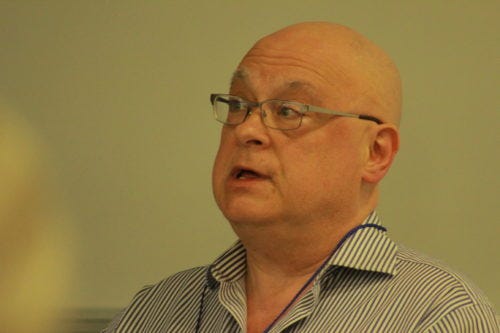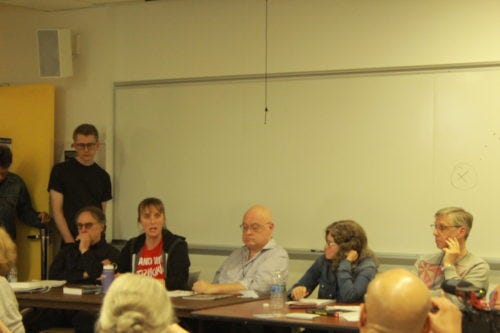The Development of the Right: Left Forum Day 2
A panel discussion on the rise of the right wing in Europe and the US started with a warning on the right and concluded with a question for the left.
The panel, Capitalism’s Right Turn: From Far Right Populism to Authoritarian Neoliberal State, featured Leo Panitch and Greg Albo of the Monthly Review, Doug Henwood, author of My Turn and interviewee at this site, Barbara Epstein of the University of Southern California, Santa Cruz, Austrian journalist Walter Baier, and Jacobin editor Nicole Aschoff.
Albo introduced the panel and The Politics of the Right: Socialist Register 2016, the edited volume he and Leo produced in advance of the panel. He said that “the hardening of authoritarian neoliberal state structures was of great strategic importance in analysis of the right today.”
“We shouldn’t worry about restraining ourselves,” Albo said of the left, “We should fight for our spaces.”
[B]aier spoke first. He described the current right wing ascendancy in Europe in general, and in his native Austria in particular.
The Austrian Freedom Party is on the cusp of possibly winning a majority in Austria, he said, the first time in decades that such an extremist right wing party has assumed power in the west.
“While Nazism is inscribed in DNA of Austrian Freedom Party,” Baier said, “It is important to see the right wing populism in its place. It’s a defense of welfare state but only for some, for example.”
For Baier, the rise of the right in Europe is directly related to the “deterioration of inter-relations… between transnational and national democracies.”
“Without both democracies in place,” he said, “We will see Europe decline into fascism.”
[H]enwood followed with some comments on the history of the American right.
“The roots of the current American right is what Hoftstader calls pseudo-conservatism,” he said. “It’s a deep-seated dissatisfaction with existing institutions which is in many ways the opposite of real conservatism. Real conservatism is more cautious.”
Henwood went back to the 1950s. Back then, what we know as the ideology of the Republican Party were fringe beliefs. President Eisenhower was loathed by these people, Henwood said. And during his presidency they both created the John Birch Society and started the National Review.
From there, it was a slow and disciplined takeover of the Republican Party. In 1960, Goldwater tried to take the presidential nomination and was beaten back by Nixon. In 1964, Goldwater succeeded, “the serfs taking over the castle.”
By 1980, Reagan had assumed the presidency despite the discomfort of the business class and movement conservatism had fully assumed control of the Republican Party. Since then, the transformation of American politics has been total.
“People have said that the most lasting achievement of Thatcher was what happened to the Labour Party,” Henwood said. “You could say the same for Reagan and the Democrats. Obama never stops praising Reagan. The Democratic Party has become completely corporatized.”
[E]pstein and Aschoff’s remarks were brief. Both women took different approaches to Baier and Henwood.
Epstein used anecdotal experiences from her friends in Illinois to show how the American electorate is dissatisfied with both Trump and Clinton. She said people in the town reject Clinton on the grounds that she is fundamentally dishonest, while Trump is a non-starter because of his repulsive, embarrassing statements.
Epstein added that the left should embrace any alternative to neoliberalism in the short term, whether or not that alternative is fully socialist or not.
Aschoff, on the other hand, had more questions than answers. She asked the panel, rhetorically, about the potential for a strategic left, and how to combat the left.
Aschoff also asked if the right wing’s processes of power were related to similar economic demands as the left, or if the demands stemmed from xenophobia. There was no clear reply.
[P]anitch closed the session with brief audience discussion with mainly revolved around how to work within or without the system to effect change. Ideas ranged from organizing alternatives to the Democratic Party to working with existing arms of its power structure like The Working Families Party.
One audience member asked the most important question, though:
“What’s worse for the left: A Sanders loss or a Sanders victory?






